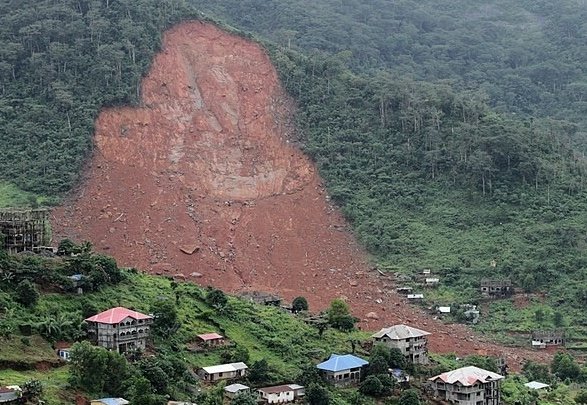IMF Highlights RoadMap On Climate Challenge
 Sierra Leone Land Slide August 2017
Sierra Leone Land Slide August 2017
An International Monetary Fund's (IMF) High-Level Summary Technical Assistance Report for 2024 has reported that Sierra Leone is experiencing vital shifts in its climatic conditions.
The shifts, according to the report are characterized by rising temperatures, erratic rainfall patterns, and increased frequency of extreme weather events such as flooding and drought. These are posing threat to the livelihood of individuals that largely depends on agriculture—an industry that accounts for approximately 43% of the Gross Domestic Product (GDP). The consequences of climate-related disasters, such as the severe flooding witnessed in September 2024, have exacerbated issues surrounding food security, health, and housing, with many households facing severe food insecurity.
According to the report, access to reliable energy remains a significant hindrance to development, ‘with less than 40% of the population having access to electricity’. The current energy system primarily relies on hydropower and imported fossil fuels, which are expensive and inefficient. Vulnerabilities in the energy sector ranging from low infrastructure to low bill collection rates—demand comprehensive reform. The report made the following recommendations:
- Sector Reform: Implementing adjustments to energy tariffs, enhancing the engagement of Independent Power Producers (IPPs), and investing in renewable energy sources, particularly solar mini-grids. Emphasis on rural electrification is also crucial to bridge the gap in service provision.
- Suited Fiscal Policies: Reinstating the General Sales Tax (GST) for fuels in tandem with adjustments that keep pace with inflation and exchange rate fluctuations will help guide a transition to cleaner energy alternatives.
Despite Agricultural Sustainability and Forest Management being crucial for economic activity, agricultural practices in the country are under threat from deforestation and unsustainable management strategies. With the agriculture and land-use sectors accounting for approximately 60% of the country's emissions, IMF recommendations include:
- Forest Management: Strengthening policy frameworks to support reforestation and prevent deforestation, supported by a thorough forest inventory to monitor and enforce preservation efforts.
- Sustainable Agricultural Practices: Promoting farming techniques that reduce the ecological footprint, along with community education on sustainable practices.
With Water Resource Management and Waste Management increasingly vulnerable to both climate change and anthropogenic stressors, the government has established frameworks for water management, including the National Water Resources Management Agency, recommendations here include:
- Capacity Building: Enhancing public awareness of water permit systems and strengthening data collection for effective management of water resources.
- Waste Management Initiatives: Introducing incentives such as an expanded advance disposal fee for plastics to promote recycling initiatives, alongside a future refund system to encourage proper waste disposal.
As increasing incidents of natural disasters, effective disaster risk management becomes critical. The establishment of the National Disaster Management Agency is a positive step forward; however, a shift in focus from disaster response to proactive risk mitigation strategies is recommended:
- Land-Use Planning and Infrastructure: Implementing stringent land-use regulations and building codes will foster resilience in urban peripheries and coastal areas.
- Early Warning Systems (EWS): Developing a unified multi-hazard early warning system can enhance preparedness and response considering that the current systems only cater to limited populations.
The Fund noted that the country’s existing legal framework for climate change response is a work under progress and lacks coherence. ‘The new Climate Change Act sets forth an opportunity to redefine institutional roles while necessitating updates to sectoral laws to incorporate climate considerations systematically’. Emphasizing data accessibility and encouraging cooperation across sectors will be important for effective climate governance.
01-01-2025





